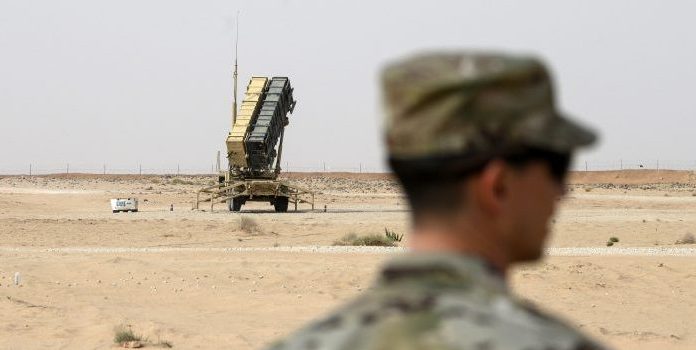(Headline USA) Desperate to prevent Saudi Arabia from going rogue by replacing US-backed petrodollars with the Chinese yuan, bungling US President Joe Biden stepped deeper into a quagmire of diplomatic quid-pro-quo deals to counteract the massive concessions in his recent Iran nuclear deal.
Biden handed off negotiations in the Iran deal to Russia and China—the two greatest adversaries of Western values and insterests—and essentially was left with a deal even worse than that negotiated under the Obama administration.
Iran is likely to continue to aggressively pursue its nuclear arsenal, while the lifting of sanctions—not related to its nuclear weapons but to its sponsorship of terrorism—poses the threat of greater instability in the Middle East.
While Israel is likely the most vulnerable from an emboldened and enriched Iran, Saudi Arabia has made clear its displeasure with Biden’s betrayal by refusing to play ball in the oil market.
With Iran-backed Yemeni rebels increasing their attacks on Saudi interests, the oil-rich kingdom suggested it might destabilize US currency by dealing its oil in Chinese yuan instead.
To prevent this economic catastrophe, Biden is now offering weapons to the Saudi’s that will enable them to better wage war on the Yemenis who also are being indirectly funded by the US via the latest set of Iran kickbacks.
The U.S. has transferred a significant number of Patriot antimissile interceptors to Saudi Arabia in recent weeks as the Biden administration looks to ease what has been a point of tension in the increasingly complicated U.S.–Saudi relationship.
A senior administration official confirmed Sunday night that the interceptors have been sent to Saudi Arabia.
The official, who spoke on the condition of anonymity to discuss a decision that has not been formally announced, said the decision was in line with Biden’s promise that “America will have the backs of our friends in the region.”
White House national security adviser Jake Sullivan on Sunday condemned Houthi forces in Yemen after they unleashed one of their most intense barrages of drone and missile strikes on Saudi Arabia’s critical energy facilities, sparking a fire at one site and temporarily cutting oil production at another.
The Associated Press reported in September that the U.S. had moved its own Patriot defense system from Prince Sultan Air Base outside of Riyadh even as the kingdom faced continued to face air attacks from Yemen’s Houthi rebels.
The kingdom has insisted that the interceptors are critical to their defense against Houthi attacks. The Saudis have been locked in a stalemate war with the Houthis since March 2015.
At the time the U.S. Patriot systems were moved out of the kingdom, administration officials said the shift in defense capabilities was made in part due to a desire to face what American officials see as the looming “great powers conflict” with China and Russia.
Pentagon officials noted that the U.S. maintained tens of thousands of forces and a robust force posture in the Middle East representing “some of our most advanced air power and maritime capabilities.”
The decision to fortify Saudi Arabia’s supply of interceptors was first reported by the Wall Street Journal.
The U.S.–Saudi relationship has been strained since Biden took office. The president has refused to deal directly with Crown Prince Mohammed bin Salman and has removed the Houthis from a list of designated terrorist groups.
The Biden administration last year released a declassified intelligence report concluding that the crown prince, son of the aging King Salman and known as MBS, had authorized the team of Saudi security and intelligence officials that killed journalist Jamal Khashoggi in October 2018 at the Saudi consulate in Istanbul.
The killing of Khashoggi, a critic of MBS, drew global condemnation. The crown prince insists he was not involved in the operation carried out by Saudi operatives.
In a recent interview with the Atlantic, the crown prince was asked whether Biden misunderstands something about him.
He responded, “Simply, I do not care” and that it was up to Biden to think “about the interests of America” when weighing his dealings with the Saudi monarchy.
The White House dispatched Brett McGurk, the National Security Council’s Middle East coordinator, and the State Department’s energy envoy, Amos Hochstein, to Riyadh last month to talk to Saudi officials about a range of issues—chief among them the ongoing war in Yemen and global energy supplies.
The Saudis have thus far declined to pump more crude to alleviate a spike in global oil prices that’s been spurred by Russia’s invasion of Ukraine.
Adapted from reporting by the Associated Press

